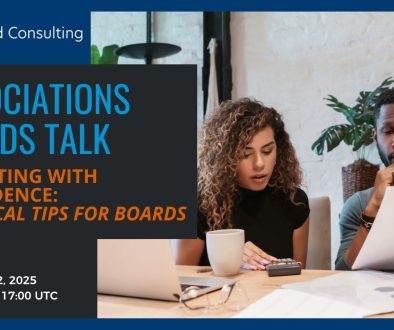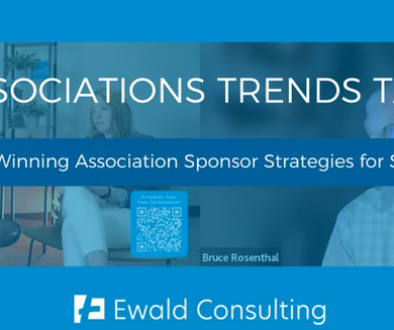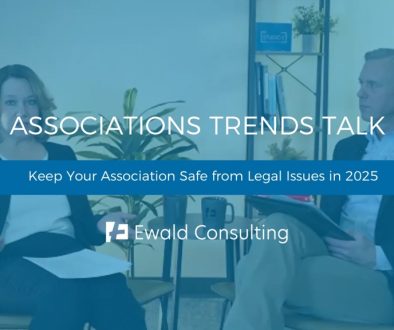The Board’s Duty of Foresight
Ewald Consulting welcomed Jeff De Cagna, AIMP, FRSA, FASAE to our Associations Trends Talk on July 17, 2024. Jeff is a long-time association community contributor and executive advisor for Foresight First LLC in Reston, Virginia. Here are some highlights from his presentation.
What will our successors say about us as association leaders?
- They will evaluate our actions / judgments.
- We need to take our current focus away from legacy — as that is a narrative about what we did, not what we did for them in the future.
- Foresight lets us imagine how we can leave our associations better than we found them.
Duty of foresight
- How do we avoid mistakes? As an example, Jeff told the story of how the board at Blackberry failed to anticipate competition, and ultimately became irrelevant.
- To avoid failure, boards of directors need to choose the duty foresight, which involves intentional learning, short-term sacrifice and long-term action.
How does foresight work, and why is it essential?
- Intentional learning is a non-negotiable requirement (otherwise, how can we learn what we need?).
- Foresight is not just about data—it’s also about imagination.
- We need to look at the far future (7-10 years from now) and imagine what the world will look like then — including a look at futures that are unfavorable and futures that are unthinkable.
- Making sacrifices today will let us act differently moving forward.
- We can practice foresight by repeating work to build performance and deepen impact (not just connected to strategy; it must be consistent, repeated work).
Choosing the future
- Foresight is a choice that we must make. It will give our board a deeper sense of responsibility, and a mindset of long-term adaptation.
- Association boards are human systems responsible for stewarding human systems into the future. Think about how to move the system of the association into the future.
- The issues that are facing us and the choices boards must make won’t get easier; they will get more difficult. The sooner we can deal with the issues, the better we can prepare for a turbulent future.
The BANI Framework
Jeff recommended that rather than using a VUCA (Volatile, Uncertain, Complex and Ambiguous) model of the world, boards should use the BANI Framework developed by futurist Jamais Cascio.
- Brittle: systems such as supply chains, food supply and health care are brittle, and we must look at how to shore them up and make them more resilient.
- Anxious: the depth, breadth and intensity of brittle systems are causing great anxiety, exemplified by increasing rates of drug use and suicide.
- Non-linear: Seemingly small decisions can have massive consequences; for example, the spread of COVID was non-linear and linear thinking probably allowed it to spread even more rapidly.
- Incomprehensible: AI is a great example; even those who work with AI closely don’t understand exactly how those systems work.
Why does the board’s duty of foresight remain a radical idea ten years later?
- We need to make this a radical idea so it never settles into a comfortable place of best practices.
- Foresight is the only construct that challenges boards to prioritize their successors.
- It demands unique board work. Rather than focusing on oversight or policy development, which can be assigned to other groups within the association, the board needs to focus on intentional learning, taking responsibility for stewarding for the future.
- Foresight moves with the larger world. It doesn’t simply involve the trade or profession served by a specific association or nonprofit.
The big question: What will our successors say about us?
There are fewer than 2,000 days left in this decade. How will we take action? We want our successors to think about us as people who cared about them. The duty of foresight is a moral choice, and an important choice to make.
Additional resources
Jeff’s recent presentations and articles
Fit-for-Purpose Association Board Director Learning Series, a collaboration between Association Forum of Chicagoland and Foresight First LLC




